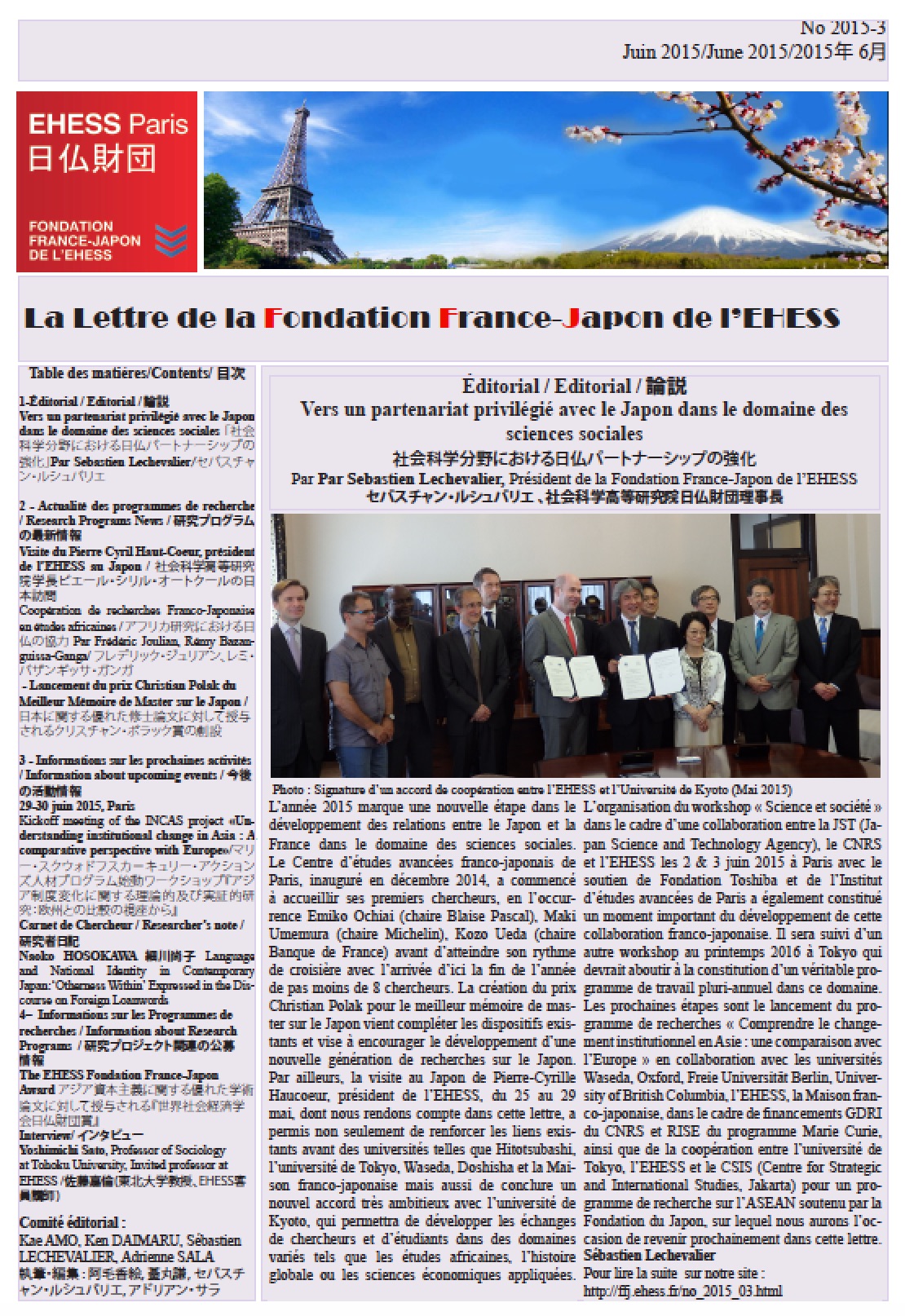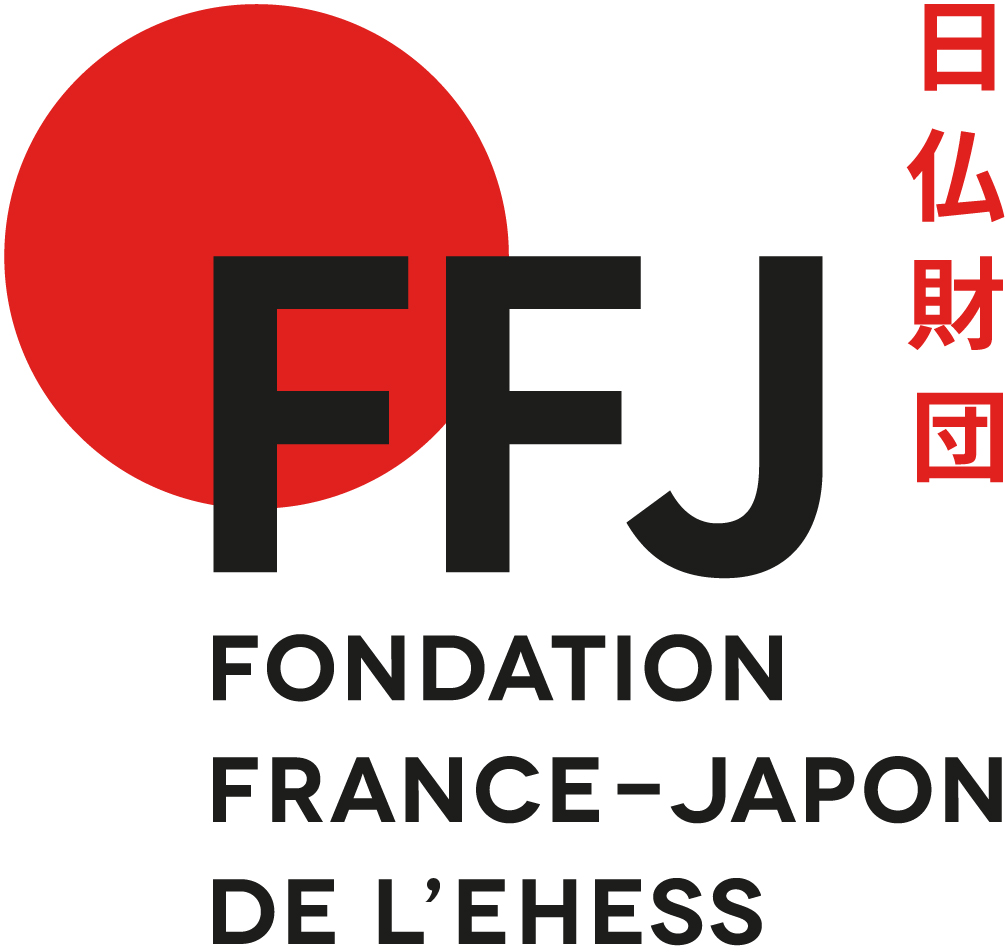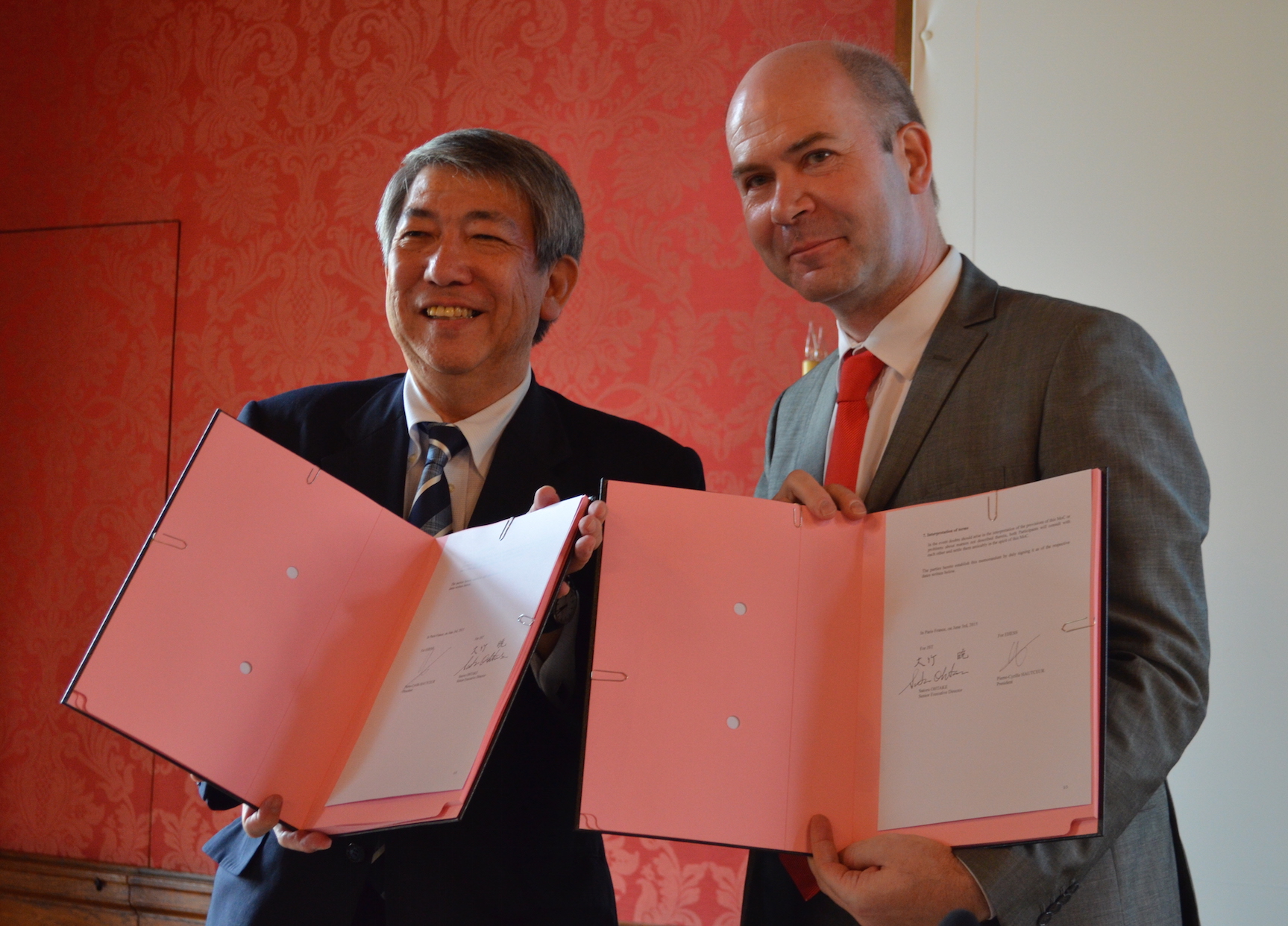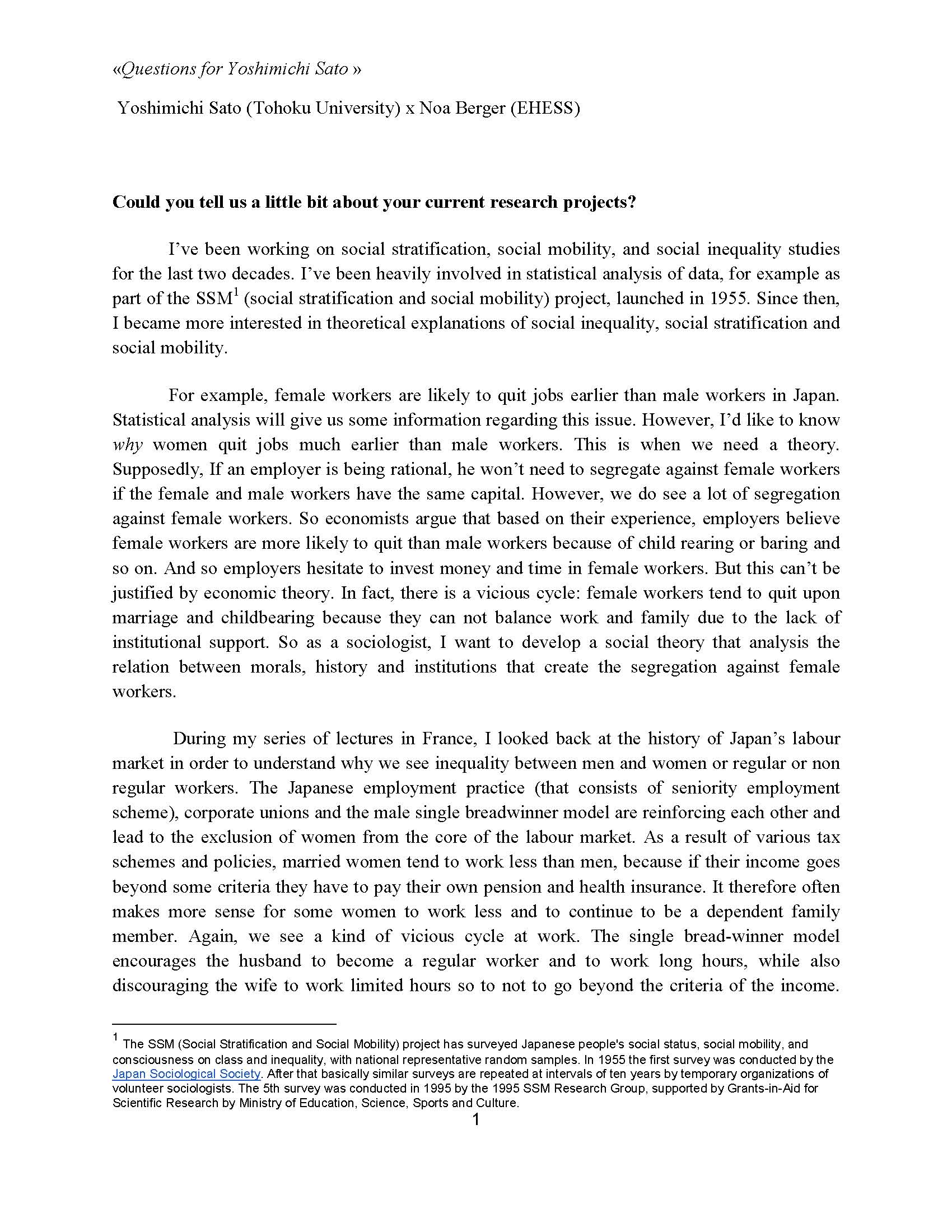La Lettre de la Fondation France-Japon de l'EHESS
No 2015-03
June 2015
 |
1 - Éditorial
« Vers un partenariat privilégié avec le Japon dans le domaine des sciences sociales »
Par Sébastien Lechevalier, Président de la Fondation France-Japon de l'EHESS
2 - Actualité des programmes de recherche
L’année 2015 marque une nouvelle étape dans le développement des relations entre le Japon et la France dans le domaine des sciences sociales. Le Centre d’études avancées franco-japonais de Paris, inauguré en décembre 2014, a commencé à accueillir ses premiers chercheurs, en l’occurrence Emiko Ochiai (chaire Blaise Pascal), Maki Umemura (chaire Michelin), Kozo Ueda (chaire Banque de France) avant d’atteindre son rythme de croisière avec l’arrivée d’ici la fin de l’année de pas moins de 8 chercheurs. La création du prix Christian Polak pour le meilleur mémoire de master sur le Japon vient compléter les dispositifs existants et vise à encourager le développement d’une nouvelle génération de recherches sur le Japon.
Par ailleurs, la visite au Japon de Pierre-Cyrille Haucoeur, président de l’EHESS, du 25 au 29 mai, dont nous rendons compte dans cette lettre, a permis non seulement de renforcer les liens existants avant des universités telles que Hitotsubashi, l’université de Tokyo, Waseda, Doshisha et la Maison franco-japonaise mais aussi de conclure un nouvel accord très ambitieux avec l’université de Kyoto, qui permettra de développer les échanges de chercheurs et d’étudiants dans des domaines variés tels que les études africaines, l’histoire globale ou les sciences économiques appliquées.
L’organisation du workshop « Science et société » dans le cadre d’une collaboration entre la JST (Japan Science and Technology Agency), le CNRS et l’EHESS les 2 & 3 juin 2015 à Paris avec le soutien de Fondation Toshiba et de l’Institut d’études avancées de Paris a également constitué un moment important du développement de cette collaboration franco-japonaise. Il sera suivi d’un autre workshop au printemps 2016 à Tokyo qui devrait aboutir à la constitution d’un véritable programme de travail pluri-annuel dans ce domaine.
Les prochaines étapes sont le lancement du programme de recherches « Comprendre le changement institutionnel en Asie : une comparaison avec l’Europe » en collaboration avec les universités Waseda, Oxford, Freie Universität Berlin, University of British Columbia, l’EHESS, la Maison franco-japonaise, dans le cadre de financements GDRI du CNRS et RISE du programme Marie Curie, ainsi que de la coopération entre l’université de Tokyo, l’EHESS et le CSIS (Centre for Strategic and International Studies, Jakarta) pour un programme de recherche sur l’ASEAN soutenu par la Fondation du Japon, sur lequel nous aurons l’occasion de revenir prochainement dans cette lettre.
2 - Actualité des programmes de recherche
Visite officielle du Président de l'EHESS au Japon
Pierre-Cyrille Hautcoeur, président de l'EHESS, a visité quatre autres universités japonaises : l'Université de Tokyo, l'Université Hitotsubashi, l'Université de Waseda et l'Université Doshisha. Il a également rencontré de très nombreux responsables de la politique de recherches et de la science au Japon dont M. Yamanaka, vice-ministre de l'éducation et M. Ando, président de la Fondation du Japon.
Le président Juichi Yamagiwa a affirmé son souhait de renforcer les recherches en sciences sociales dans le cadre de cette collaboration avec l'EHESS. A travers cet accord, les deux institutions visent à renforcer leur coopération à travers un programme d'échange de chercheurs ainsi que la mise en place de programmes de recherches communs.
Coopération franco-japonaise dans le domaine de la recherche en études africaines
L’Ecole africaniste de Kyoto, à la différence de celle de Tokyo, qui mobilise davantage un modèle théorique anglo-saxon, s’appuie sur des études de terrain fortes, sur des projets de recherche et de formation interdisciplinaires (notamment dans leurs composantes naturalistes comme celles de la primatologie, de l’écologie ou de l’agronomie) et sur une philosophie de « recherche-formation » proche de celle de l’Ehess dans l’exigence et l’accompagnement des étudiants. Divers colloques et séminaires ont été organisés ; les deux derniers cette année en février à Kyoto International Workshop: ‘Construction of a Global Platform for the Study of Sustainable humanosphere » et en juin à Marseille « Animalités croisées, animalités partagées ». La convention signée avec l’Université de Kyoto vient aujourd’hui confirmer les échanges et travaux menés maintenant depuis plus de dix ans en anthropologie de la nature et en primatologie (F. Joulian, M. Shigeta, G. Yamakoshi, M. Kaneko, M. Ichikawa) (http://tc.revues.org/5261 ) et maintenant projetés en sociologie politique de l’Afrique (R. Bazenguissa, U. Ohta). Elle devrait permettre de faciliter les échanges d’étudiants et de chercheurs et inciter à de nouveaux programmes communs en Afrique et Asie.
Signature d'un accord de coopération entre l'EHESS et la JST
La cérémonie de signature du Mémorandum de coopération entre la Japan Science and Technology Agency et l'EHESS a eu lieu le 3 juin 2015 à l'Institut d'études avancées de Paris à l'occasion du colloque international "Engaging Society in Innovation and in Creativity : Perspectives from Social Sciences and Humanities".
Pour en savoir plus : http://ffj.ehess.fr/20150602.html
3 - Informations de la Fondation France-Japon
29-30 juin 2015, Paris
Kick-off meeting of the INCAS project "Understanding institutional change in Asia : A comparative perspective with Europe"
29-30 juin 2015, Paris
Kick-off meeting of the INCAS project "Understanding institutional change in Asia : A comparative perspective with Europe"
The Fondation France-Japon de l'EHESS has successfully coordinated the joint application of the EHESS, Waseda University, Oxford University, Freie Universität Berlin and the Maison Franco-Japonaise to the RISE Marie Curie program in 2014. This program will allow its members to conduct joint research on "Understanding institutional change in Asia : A comparative perspective with Europe" between 2015 and 2018. It is complemented by another funding, provided by the CNRS (GDRI) coordinated by the EHESS, and involving the EHESS, the CNRS, Waseda University, Freie Universität Berlin, and the University of British Columbia.
The major aim is to challenge and extend existing theories of institutional change by comparing the experiences of Japan and few other Asian countries with those of European capitalisms. The project group will examine several aspects previously overlooked by existing approaches, such as: the historical experience of institutional change in Asia during its growth and development; the relations between (especially financial) liberalization and corporate diversity; the interaction between political economy, socio-economic and legal variables.
Venue: EHESS (190 Avenue de France 75013 Paris, conference room 638-640 – 6th floor)
Participants: Yasuhiro Arikawa, Shinichi Hirota, Masaru Kono, Hideaki Miyajima, Yoshiaki Ogura, Fu Jiangtao, Kohei Kawamura, Verena Blechinger-Talcott, Gregory Jackson, Julia Bartosch, Susanne Brucksch, Howard Gospel, Mari Sako, Hugh Whittaker, Masahiro Kotosaka, Nam Lee, Sébastien Lechevalier, Angelo Riva, Lala Dadci, Pauline Debanes, Jeremy Ducros, Haengsun Kim, Adrienne Sala, Soulia Bentouhami, Kae Amo, Ken Daimaru
« Language and National Identity in Contemporary Japan: ‘Otherness Within’ Expressed in the Discourse on Foreign Loanwords »
By Naoko HOSOKAWA, University of Oxford
This study is concerned with the relation between language and national identity in contemporary Japan, in particular the manner in which visions of ‘Japaneseness’ are expressed and reproduced through the display of public attitudes towards foreignisms in contemporary Japan. The proposed hypothesis is that certain foreign loanwords known as gairaigo are excluded from the perceptual framework of the Japanese language (nihongo), thereby playing a contrapuntal role in conceptualising national language as a source of national identity. I thus suggest that the recent debates on the use of loanwords can be understood as a particular manifestation of the ongoing (re)negotiation of national identity. To attest this hypothesis, contemporary discussion on the use of gairaigo will be scrutinised, using letters to the editors of two major newspapers in Japan. It will be concluded that debates on the use of loanwords are highly reliant upon notions of national consciousness and that loanwords represent a foreignness, or otherness, felt within a society that constructs an ‘internal Other’ to a Japanese ‘Self’, the identity of which is neither autonomous nor clearly delineated. /.../
4 - Actualités de la Fondation France-Japon
2015 Netwwork Q/Fondation France-Japon Award for Best Paper
The Research Newtwork Q - Asian Capitalisms of the Society for the Advancement of Socio-Economics (SASE), through generous support from the EHESS Fondation France-Japon and Banque de France, has created SASE Network Q/Fondation France-Japon Award.
Each year a prize of €1,000 is awarded to the best full paper submitted to Network Q for the SASE annual conference. The paper is judged both for overall excellence and for its pertinence to the theme of Asian capitalisms in particular. Among papers of equal excellence, preference is given to scholars working in Asia.
We extend warm congratulations to the recipients of the 2015 EHESS France-Japon Foundation Award for Best Paper:
We extend warm congratulations to the recipients of the 2015 EHESS France-Japon Foundation Award for Best Paper:
A. K. M. Skarpelis (New York University) : "War, Authoritarianism and the Origins of the Japanese Welfare State"
Download the article
Anna K. Skarpelis is a doctoral candidate in the department of sociology at New York University. Her dissertation investigates the racialised dimensions of German and Japanese welfare states from the early 20th century until the end of World War Two. She is currently working on a collaborative project with Stefan Bargheer (UCLA) that investigates changing conceptions of race through WWII-period Japanese and American military intelligence. In the past, she has worked on a digital methods project on the Japanese communications crisis after the Fukushima nuclear accident, the role of Massive Open Online Courses in US higher education (with Vasant Dhar and Arun Sundararajan at Stern School of Business), and German wage regulation.
The prizewinner will be honored at the Awards Ceremony on the occasion of the SASE Annual Meeting that will take place at London School of Economics from July 4th to 6th 2015.
Création du Prix Christian Polak du Meilleur Mémoire de Master sur le Japon
 |
|
Grâce à la générosité de M. Christian Polak, la Fondation France-Japon de l'EHESS est heureuse de décerner pour la première fois en 2015 le prix du meilleur mémoire de master portant sur le Japon dans une perspective aréale ou comparée, toutes disciplines des sciences sociales et humaines confondues.
Le prix Christian Polak du Meilleur Mémoire de Master sur le Japon, d'un montant de 2 000 €, a pour finalité de récompenser l’excellence et la valeur universitaire et scientifique d'un mémoire de master soutenu dans un établissement de recherches et d’enseignement supérieur français au cours de l'année universitaire précédant l’année universitaire d'attribution.
Le prix Christian Polak du Meilleur Mémoire de Master sur le Japon, d'un montant de 2 000 €, a pour finalité de récompenser l’excellence et la valeur universitaire et scientifique d'un mémoire de master soutenu dans un établissement de recherches et d’enseignement supérieur français au cours de l'année universitaire précédant l’année universitaire d'attribution.
Pour l'année 2014-2015, la date d'envoi des dossiers est fixée au jeudi 15 octobre 2015 au plus tard. Le mémoire doit être accompagné d’un résumé d’une page et d’un avis motivé du Directeur de mémoire à l’attention du Jury de la Fondation France-Japon de l'EHESS.
« Questions à Yoshimichi Sato »
Yoshimichi Sato (Université de Tohoku) x Noa Berger (EHESS)
Could you tell us a little bit about your current research projects?
I’ve been working on social stratification, social mobility, and social inequality studies for the last two decades. I’ve been heavily involved in statistical analysis of data, for example as part of the SSM (social stratification and social mobility) project, launched in 1955. Since then, I became more interested in theoretical explanations of social inequality, social stratification and social mobility.
For example, female workers are likely to quit jobs earlier than male workers in Japan. Statistical analysis will give us some information regarding this issue. However, I’d like to know why women quit jobs much earlier than male workers. This is when we need a theory. Supposedly, If an employer is being rational, he won’t need to segregate against female workers if the female and male workers have the same capital. However, we do see a lot of segregation against female workers. So economists argue that based on their experience, employers believe female workers are more likely to quit than male workers because of child rearing or baring and so on. And so employers hesitate to invest money and time in female workers. But this can’t be justified by economic theory. In fact, there is a vicious cycle: female workers tend to quit upon marriage and childbearing because they can not balance work and family due to the lack of institutional support. So as a sociologist, I want to develop a social theory that analysis the relation between morals, history and institutions that create the segregation against female workers.
During my series of lectures in France, I looked back at the history of Japan’s labour market in order to understand why we see inequality between men and women or regular or non regular workers. The Japanese employment practice (that consists of seniority employment scheme), corporate unions and the male single breadwinner model are reinforcing each other and lead to the exclusion of women from the core of the labour market. As a result of various tax schemes and policies, married women tend to work less than men, because if their income goes beyond some criteria they have to pay their own pension and health insurance. It therefore often makes more sense for some women to work less and to continue to be a dependent family member. Again, we see a kind of vicious cycle at work. The single bread-winner model encourages the husband to become a regular worker and to work long hours, while also discouraging the wife to work limited hours so to not to go beyond the criteria of the income. Anticipating that outcome, Japanese companies then hire male workers as regular workers and female workers as non regular workers. This vicious cycle is supported by some institutions such as the tax scheme or the pension system. Nobody created these systems or policies to exclude women intentionally from the labour market or push them towards the periphery of the market. But, once these systems are introduced in Japan, people react rationally to them rationally. People tend to react to policies and institutions in a rational way: once they react to the institutions, they become stable and difficult to change. So I try to analyse how the self reinforcing cycle between the family and the labour market has evolved over the years in Japan.
I’ve been working on social stratification, social mobility, and social inequality studies for the last two decades. I’ve been heavily involved in statistical analysis of data, for example as part of the SSM (social stratification and social mobility) project, launched in 1955. Since then, I became more interested in theoretical explanations of social inequality, social stratification and social mobility.
For example, female workers are likely to quit jobs earlier than male workers in Japan. Statistical analysis will give us some information regarding this issue. However, I’d like to know why women quit jobs much earlier than male workers. This is when we need a theory. Supposedly, If an employer is being rational, he won’t need to segregate against female workers if the female and male workers have the same capital. However, we do see a lot of segregation against female workers. So economists argue that based on their experience, employers believe female workers are more likely to quit than male workers because of child rearing or baring and so on. And so employers hesitate to invest money and time in female workers. But this can’t be justified by economic theory. In fact, there is a vicious cycle: female workers tend to quit upon marriage and childbearing because they can not balance work and family due to the lack of institutional support. So as a sociologist, I want to develop a social theory that analysis the relation between morals, history and institutions that create the segregation against female workers.
During my series of lectures in France, I looked back at the history of Japan’s labour market in order to understand why we see inequality between men and women or regular or non regular workers. The Japanese employment practice (that consists of seniority employment scheme), corporate unions and the male single breadwinner model are reinforcing each other and lead to the exclusion of women from the core of the labour market. As a result of various tax schemes and policies, married women tend to work less than men, because if their income goes beyond some criteria they have to pay their own pension and health insurance. It therefore often makes more sense for some women to work less and to continue to be a dependent family member. Again, we see a kind of vicious cycle at work. The single bread-winner model encourages the husband to become a regular worker and to work long hours, while also discouraging the wife to work limited hours so to not to go beyond the criteria of the income. Anticipating that outcome, Japanese companies then hire male workers as regular workers and female workers as non regular workers. This vicious cycle is supported by some institutions such as the tax scheme or the pension system. Nobody created these systems or policies to exclude women intentionally from the labour market or push them towards the periphery of the market. But, once these systems are introduced in Japan, people react rationally to them rationally. People tend to react to policies and institutions in a rational way: once they react to the institutions, they become stable and difficult to change. So I try to analyse how the self reinforcing cycle between the family and the labour market has evolved over the years in Japan.
I have not yet come up with a good solution on to break the cycle. Global forces such as globalisation or demographic forces may change people’s mind: the need to have more women in the work force to compensate for the loss of labour force. We therefore witness new policies and laws that are introduced in Japanese society which lead to the entry of more married women into the labour market as full time workers.
Did any of your your experiences in France shed a new light on the questions you’ve mentioned? did you gain a new perspective during your visit?
Before coming here I checked some statistics about France. The fertility rate is much higher than in Japan, which is a good signal for maintaining a sustainable society. But I’ve been concerned about the high unemployment rate of young people and the rise of precarious jobs. So even though Japan’s economy is bad, we see that the unemployment rate of young people is much lower in Japan than in France. Once young people are trapped in the precarious employment sector or the non regular employment sector, it will be difficult for them to accumulate human capital to advance professionally.
I’m very concerned about the future of young people in France as well as about that of French society, because if young precarious workers can not accumulate the human capital and secure regular or more stable jobs the French society would become unstable. If young people can not work, the social security system would eventually become unstable, so even people of old age would not be able to enjoy a stable pension system or health insurance system in the future.
How do you feel about Japan’s future in terms of inequality, employment markets and precariousness?
As I said, Japan’s unemployment rate is much lower than that of France, but the mechanisms that creates the situation are similar. My hope is that inequality in Japan is currently not as serious as in Europe or the United States. This would be due to the family structure. But this is changing: some non-regular workers live with their parents, who provide them with a house and meals. But what happens when these parents pass away? Some middle aged unemployed people in Japan do not report the death of their parents because they want their parents’ pension to be continued. We then witness many people older than a 100 years old on paper, although many of them passed away many years ago.Their children did not report their death because their parents’ pension was their only way for them to make ends meet. What will happen to such middle aged non-regular workers?
Do you have any advice that you would like to share with young scholars?
My advice is to get unplugged: as social scientists, we live inside the society but also in its borders. We are a part of society, however, we observe the society, interpret the society, explain the society. As a social scientist, you need to unplug yourself from the society. To do so, I often advise two strategies to my students: one is to compare. By comparing France with Japan, for example, many things that you thought were given in France will not be so in Japan.The second strategy is to look back at history. If you compare today’s France with France of the 1950s, you will also see a huge difference, and you will note the things that are given now and that have not been so 50 years ago. It’s by doing this that you can apply yourself. Don’t assume anything is obvious or given: you should tend to think of everything as socially constructed over the years. Then you can come up with a nice research question as to why we see such differences. This differences will need to be explained: a good way to open the door to a new theory.
Paris, May 2015
Editorial :
Kae AMO, Ken DAIMARU, Sébastien LECHEVALIER, Adrienne SALA














